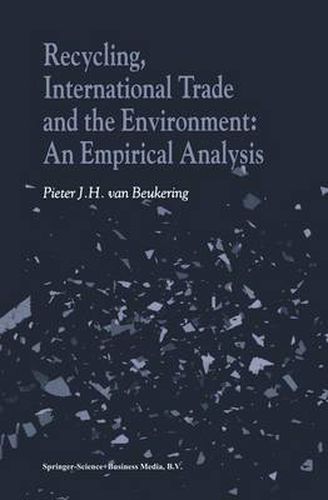Readings Newsletter
Become a Readings Member to make your shopping experience even easier.
Sign in or sign up for free!
You’re not far away from qualifying for FREE standard shipping within Australia
You’ve qualified for FREE standard shipping within Australia
The cart is loading…






This title is printed to order. This book may have been self-published. If so, we cannot guarantee the quality of the content. In the main most books will have gone through the editing process however some may not. We therefore suggest that you be aware of this before ordering this book. If in doubt check either the author or publisher’s details as we are unable to accept any returns unless they are faulty. Please contact us if you have any questions.
During the 20th century international trade has become indispensable for many economies. This is not only the case for trade in primary raw materials and consumer products but also for secondary (recyclable) materials. With the rapid growth of the recycling sector worldwide, trade in recyclables increased tremendously. It is striking that most of this trade flows from developed to developing countries. This book addresses the main causes of this typical trade pattern and investigates its economic and environmental effects by carrying out case studies on waste paper imports in India, waste plastics imports in China, and used-tyre trade in Europe. The book concludes by recommending policies that are aimed at preventing negative economic and environmental effects potentially resulting from trade in recyclables. The book offers new ideas to researchers who are involved in international trade, material flows, and waste management, and provides new insights for decision-makers who are interested in WTO and the Basel Convention.
$9.00 standard shipping within Australia
FREE standard shipping within Australia for orders over $100.00
Express & International shipping calculated at checkout
Stock availability can be subject to change without notice. We recommend calling the shop or contacting our online team to check availability of low stock items. Please see our Shopping Online page for more details.
This title is printed to order. This book may have been self-published. If so, we cannot guarantee the quality of the content. In the main most books will have gone through the editing process however some may not. We therefore suggest that you be aware of this before ordering this book. If in doubt check either the author or publisher’s details as we are unable to accept any returns unless they are faulty. Please contact us if you have any questions.
During the 20th century international trade has become indispensable for many economies. This is not only the case for trade in primary raw materials and consumer products but also for secondary (recyclable) materials. With the rapid growth of the recycling sector worldwide, trade in recyclables increased tremendously. It is striking that most of this trade flows from developed to developing countries. This book addresses the main causes of this typical trade pattern and investigates its economic and environmental effects by carrying out case studies on waste paper imports in India, waste plastics imports in China, and used-tyre trade in Europe. The book concludes by recommending policies that are aimed at preventing negative economic and environmental effects potentially resulting from trade in recyclables. The book offers new ideas to researchers who are involved in international trade, material flows, and waste management, and provides new insights for decision-makers who are interested in WTO and the Basel Convention.